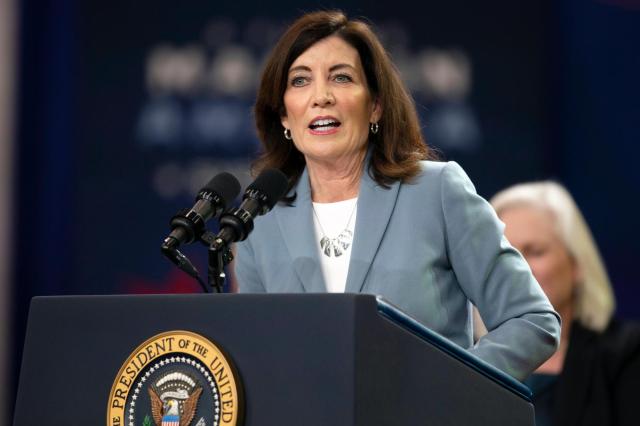
NEW YORK — Governor Kathy Hochul recently released the results of the Transgender Employment Study, conducted last year by the New York State Department of Labor (DOL) in consultation with the New York State Division of Human Rights.
According to a press release from the governor’s office, the first-of-its-kind study details the experiences of transgender, gender non-conforming, and non-binary (TGNCNB) New Yorkers in the workplace. The study’s goal was to determine whether employment disparities among TGNCNB individuals in New York State exist, evaluate factors contributing to those disparities, and recommend proposals to address barriers to equal employment.
DOL collected data through meetings with TGNCNB advocates and community leaders, five focus groups, interviews, and over 350 online public comments from counties in all ten regions of the state. This study will build on advancements to ensure New York State workplaces are safe and affirming for TGNCNB members of the workforce.
“As the birthplace of the LGBTQ+ civil rights movement, New York State has maintained a deep commitment to providing greater respect, stronger protections, and better opportunities for the LGBTQ+ community,” Hochul said in the release. “This report provides a glimpse into the work lives of trans, gender non-confirming, and non-binary New Yorkers and charts a path forward on addressing the barriers they face.
“New York remains committed to providing an open and affirming workplace for all workers, and my administration will continue to provide the resources and protections needed for every New Yorker to live free from discrimination.”
Key findings in the NYSDOL report include:
- Employment discrimination based on gender identity is pervasive throughout the state.
- TGNCNB people of color experience greater employment disparities.
- There is a lack of cultural competency statewide regarding gender identity and expression.
- There is a genuine fear for safety in the workplace among TGNCNB individuals.
- Discrimination and other barriers to employment have led TGNCNB New Yorkers to seek self-employment opportunities.
- There is a regional difference between the experiences of TGNCNB individuals in New York City and other large cities, versus those in the more rural areas of the state.
“I thank Governor Hochul for commissioning this study and helping us understand the struggles the transgender, gender non-conforming and non-binary community face. The invaluable feedback we received will help shape future policy and help eliminate barriers to equal employment,” New York State Department of Labor Commissioner Roberta Reardon said in the release.
“Collecting data leads to identifying the needs and priorities of marginalized communities. This is why I advocated for this report; to collect data on the employment of TGNCNB New Yorkers. Through my advocacy work I hope to create a future where individuals in the TGNCNB community have access to safer, more diverse and affirming employment spaces,” New York Transgender Advocacy Group founder Kiara St. James said in the release.
By engaging with the TGNCNB community statewide, the report includes recommendations for policy that can be specifically tailored to the needs of TGNCNB New Yorkers. Surveys with TGNCNB respondents conducted in New York State, and nationwide, included in this report have found that transgender people face higher rates of unemployment, lower incomes, less educational attainment and higher rates of justice involvement due to discrimination.
The report recommends the following policy additions:
- Advocating for uniform data collection regarding gender identity by Federal agencies, especially the US Census Bureau.
- Providing workforce development programming specifically for TGNCNB communities to address their unique challenges.
- Mandating cultural competency and GENDA training across the State.
- Exploring additional ways the State can reduce barriers to obtaining affirming legal identification.
- Modeling best practices for employers.
- Addressing barriers to employment for justice-involved individuals.
“This vital report, which highlights the importance of an intersectional approach, will help DHR accomplish our mission of ensuring that transgender, gender non-confirming, and non-binary individuals can participate fully in our state’s economic life. I thank Governor Hochul for initiating this effort and the team at NYSDOL, as well as community members across the state, for their partnership in producing this report,” New York State Division of Human Rights Commissioner Maria Imperial said in the release.
In her first budget, Hochul worked with the legislature to include a historic $13.5 million investment in LGBTQIA+ health and human services funding, including creating the Lorena Borjas Transgender Wellness and Equity Fund. Hochul also expanded this fund from health and human services funding to include funding for TGNCNB youth suicide prevention.
She also signed legislation to support TGNCNB New Yorkers by requiring state agencies to make an “X” gender designation available to the public on state forms that collect such information; designating New York state as a “safe haven” for TGNCNB youth, their parents, and health care providers; and enacting the Gender Inclusive Ballot Act.
Hochul also instructed the Office of General Services and the Office of Employee Relations to take actions to strengthen workplace inclusion for TGNCNB state employees, establishing a best practices model for other employers.
“Governor Hochul is once again demonstrating her commitment to transgender, gender non-conforming, and non-binary New Yorkers. We know equal employment opportunities directly impact social determinants of health and this data will further inform the programs and policies that will continue to eliminate discriminatory barriers to employment and improve diversity, equity, and inclusion in New York,” New York State Health Commissioner Dr. James McDonald said in the release.
The full results of the 2023 TGNCNB Employment Report can be found at https://nysdolreports.com/gwg/2023-tgncnb/
Any New Yorker who feels they have been discriminated against in the hiring process or workplace can file a complaint with DHR online, by mail, or in person. For more information about the law and the work of the agency, please visit the Division of Human Rights’ website at www.dhr.ny.gov or call 1-888-392-3644.



